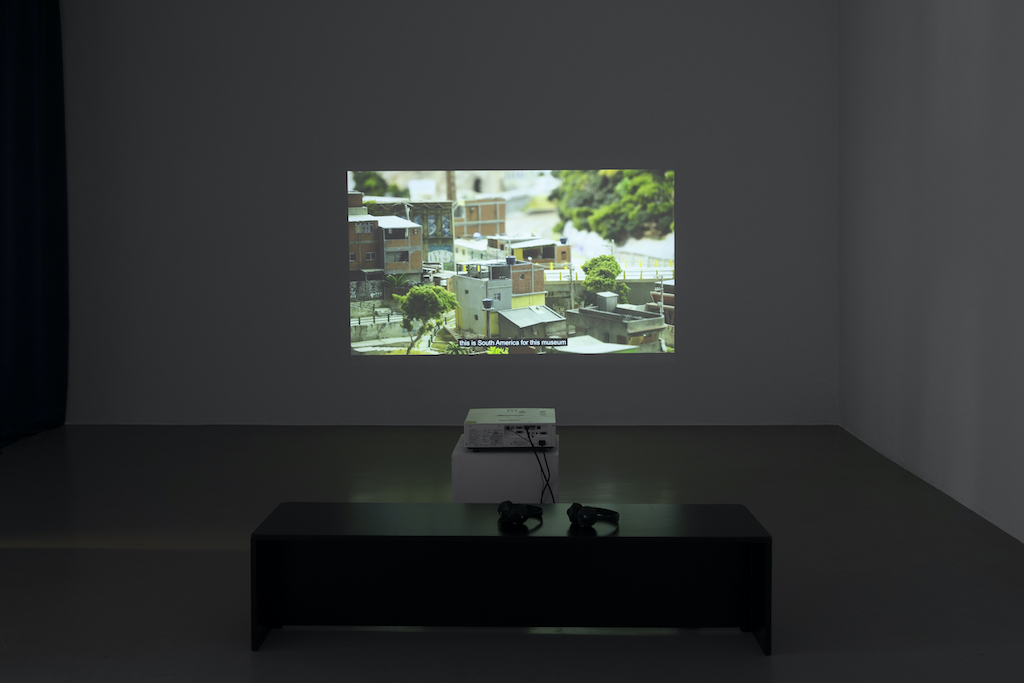
This group exhibition is the beginning of a search for a politics of friendship in connection with the question, which Gesellschaft für Aktuelle Kunst (which translates to „Society for Contemporary Art“). Friendship here does not mean – in the narrow sense – being together with friends, but (following Céline Condorelli and others) living with and acknowledging differences, persons alive and dead, objects, books, thoughts, contexts and environments – for example. The intention here is not to dissolve the self, but to permanently reconfigure it, to be open and friendly to other without leveling it or making an Other out of it. A politics of friendship concerns the actions, representations and aesthetics with which we depict and also form certain understandings and a behavior towards the world. In this sense, the exhibition gathers works by artists who propose or develop other forms of movement and a different language. They negotiate time periods of and approaches to thinking, relationships to material as well as to territories. All these aspects are linked to conflicts, power relations and contradictions, but also to possibilities.
The video work Songs from the compost by Eglė Budvytytė (*1981 in Lithuania, lives in Amsterdam) is a hypnotic exploration of the darker aspects of life: interdependencies, devotion, death and decay. But it also focuses on how human and non-human interdependencies and coexistences can be concretely expressed in patterns of movement and how forms of locomotion can be coded differently.
RA Walden (lives in Berlin) developed ẍây ithřa, a new language to replace the many performance expectations, standardizations, martial and racist metaphors that are unconsciously continuously repeated in our use of language with an interpersonal communication that underlies a different understanding of society. In the exhibition, a neon work flickers gently but persistently, reminding us of the finitude and commonality of all life. Its silent glow manifests an oral question-and-answer tradition, a relationship between two speakers.
→ Download text here
RA Walden: feladŷifâ / feladŷi, dust? / dust, 2022. Clear glass, argon and neon gas, blackout paint, power supplies. Riso printed text. Video & voice: Linda Valerie Ewert, Editing/Production: RA Walden
Atsushi Mannami (*1988 in Japan, lives in Bremen) also deals with transience. Built, sometimes senseless structures, fragile or disassembled supports form temporary, anonymous landscapes, which Mannami transfers into ceramic paintings in order to deal once again with their temporary and fragile beauty. Time and image deconstruct themselves almost casually in these small-format objects, without abandoning themselves.
Ida Lennartsson (*1982 in Sweden, lives in Berlin), on the other hand, understands sculpture as an extended narrative technique. She experiments with material and form in order to open them up as a physical and tactile form of expression of emotions beyond their usual contexts in the relationship between viewer and object. In the process, connections emerge between symbolic meanings, social values, and individual and societal readings that often address repressed sensations, rejection, and the treatment of the other.
Ida Lennartsson: WHITE (Trailer), 2023, HD Video, Courtesy the artist.
Catalina González González (*1990 in Colombia, lives in Hamburg) searches in diary-like films for ways to tackle the conflict-ridden relationships between European and Latin American localizations. In her very own narrative form, she addresses violence without reproducing it. For You After the Summer depicts on the one hand “Latin America” in the miniature wonderland Hamburg and on the other hand everyday scenes of a Latin American circle of friends in Germany. In the encounter of these two quiet narrative forms, more and more contradictions arise between the representation in small format and the reality negated in this representation.
Catalina González González: For You After the Summer, HD Video, Courtesy the artist.
In the 1970s, Martha Rosler (*1943 in New York, lives in New York) wrote three so called food novels from the perspective of three different women and published them piece by piece, every five to seven days on postcards. The three stories revolve around the social meaning of food and (female) labor, working conditions, class issues, and oppression. The interstice of reading and thinking while awaiting the sequel on the next postcard is part of Rosler’s postcard novels. Reading takes place slowly, but also almost involuntarily and intuitively, as soon as the next card lands in the mailbox. Service. A trilogy on colonization thus becomes an intimate dialogue with the respective stories and a reflection on one’s own position.
Instead of establishing a politics of friendship as a grand subject, the artists and works present in the exhibition each take up individual aspects and their ambivalences: In which old structures entrenched words do I speak, for example, when talking about changes to these very structures? Where do thinking and acting fall apart? How do I deal with nature, whilst not really wanting to give up my upright horizon perspective in favor of other fellow creatures?
The materials provided here are digital transfers or extensions of the works shown in the exhibition.
Eglė Budvytytė (with Marija Olšauskaitė and Ona Julija Lukas Steponaitytė)
Catalina González González
Ida Lennartsson
Atsushi Mannami
Martha Rosler
RA Walden
Curated by Annette Hans
Events
Fri, 03.06.22, 7 pm
Opening
*At the same time, Weserburg Museum für Moderne Kunst die Ausstellung opens the exhibition „Silvia Bächli. Lange Linien lang“. Afterwards we celebrate together in the neighboring TAU.
Sa, 18.06.22, 6 pm – midnight
Long Night of Bremen Museums
Thu, 07.07., 7 pm
Guided tour
Sun, 28.08., 3 pm
Guided tour
Support
The GAK is supported by Senator für Kultur, Freie Hansestadt Bremen
The exhibition is supported by Karin and Uwe Hollweg Stiftung, Bremen, and Beauftragte der Bundesregierung für Kultur und Medien in connection with the economic stimulus program Neustart Kultur of Kulturstiftung der Länder: Kulturgemeinschaften – Förderprogramm für digitale Content-Produktion in Kultureinrichtungen.
The participation of Eglė Budvytytė is made possible with the kind support of the Kingdom of the Netherlands
















